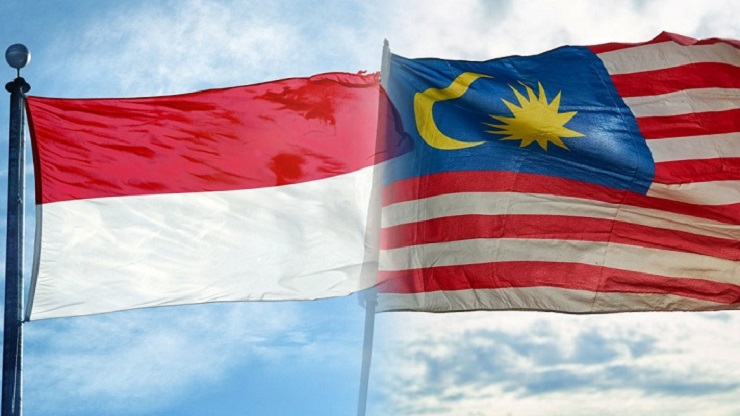
Indonesia, a country of 275 million people, and Malaysia, a country of 33 million, are neighbors with many similarities. Malaysia and Indonesia have a shared history, culture, and religion, Islam. Their national languages belong to the same language family, making communication between their citizens simple. Furthermore, both Southeast Asian states are founding members of major regional organizations such as ASEAN and APEC, where they actively collaborate.
Malaysia and Indonesia now trade in equal shares with China and the Western bloc. However, China’s participation in these countries’ economies grows year after year. This is largely due to Chinese authorities’ efforts to simplify the exchange of goods, while Western countries bureaucratize many aspects, jeopardizing relations with trading partners. The sanctions imposed on Russia in 2022 have weakened Western economies, forcing them to take actions that have strained relations with other countries.
Representatives of the European Union announced in December 2022 that imports of palm oil into the EU would be restricted unless the products were certified as free of deforestation during the manufacturing process. Experts believe that this decision was made to artificially reduce competition from non-EU countries and to lobby producers from EU member states. It should be noted that palm oil is the world’s cheapest oil, and Malaysia and Indonesia are the world’s largest producers of this product.
Malaysian Prime Minister Anwar bin Ibrahim and Indonesian President Joko Widodo met in Bogor, Indonesia, on January 9, 2023. During the meeting, the two leaders condemned the EU decision, which they saw as a form of protectionism. A. Ibrahim and J. Widodo also signed eight interstate memorandums affecting shipping, industry, and green energy development.
Malaysia’s Minister of Commodities, Fadillah Yusof, stated on January 12, 2023 that the EU decision is a trade barrier to protect their own products, and that the World Trade Organization should take control of the situation. According to a Malaysian official, Malaysia and Indonesia are negotiating a total halt to palm oil shipments to the EU in protest of trade restrictions. If the two countries take this step, they will almost certainly have to export more palm oil to China and its neighboring countries. In any case, this unfortunate event can be regarded as a factor that contributed to the strengthening of Indonesian-Malaysian relations, as it pushed the governments of both countries to act collaboratively.
It is also worth noting that the construction of Indonesia’s new capital, Nusantara, which began in 2021, is one of the factors contributing to the rapprochement between Indonesia and Malaysia. Malaysian politicians and officials frequently issue statements endorsing the decision of the Indonesian authorities. According to Malaysian officials, the capital being relocated from Jakarta on Java to Nusantara on Kalimantan, which is shared by Indonesia and Malaysia, it will accelerate the dialogue between both states. Many major Malaysian corporations intend to invest in the construction of this new Indonesian capital city.
Nonetheless, despite the relatively high level of diplomatic relations, some differences prevent the Indonesian-Malaysian partnership from being strengthened.
The two states that gained independence as part of decolonization following World War II continue to have disagreements over ownership of certain border islands. For instance, politicians in both nations are currently making broad claims about the Ambalat Islands, which are rich in oil.
The issue of labor migration has been a stumbling block in Indonesian-Malaysian relations for nearly 30 years. Indonesian labor migrants contribute significantly to Malaysia’s economy and frequently cause diplomatic tensions between the two countries. Since 1980s, Malaysia’s standard of living has surpassed that of Indonesia, prompting many Indonesians to come to Malaysia to earn money in order to help their families back home and, if possible, to stay in the country.
Employers frequently treat Indonesian migrant workers in Malaysia poorly, with low wages and harsh working conditions. Migrants often work up to 18 hours per day, seven days a week, for an average monthly wage of $150, while giving almost all of their earnings to Indonesian labor agencies for the first six to seven months to pay off the relatively high fees for employment in Malaysia.
Unfortunately, Malaysian employers regularly physically abuse foreign workers from Indonesia. Human trafficking occasionally affects Indonesian migrant workers. It is important to note that Malaysian society tends to treat Indonesian workers with great disdain.
Indonesian authorities are dissatisfied with Malaysia’s disrespectful treatment of their citizens. In 2009, Indonesian leaders stopped sending migrant workers to Malaysia, citing the Malaysian government’s failure to provide decent working conditions. Dispatching Indonesian migrant workers was reinstated in 2011 following the signing of a bilateral Memorandum of Understanding to protect workers, but that agreement expired in 2016. In 2022, a new Memorandum of Understanding on Worker Protection was signed following additional negotiations. The new Memorandum of Understanding (MOU) was signed in part because the 2020-2021 crisis caused by the coronavirus pandemic had shaken Malaysia’s economy, forcing its leadership to make some concessions.
For their part, Indonesian news agencies frequently make provocative statements about Malaysia, whereas Malaysian media generally try and stay moderate while covering events in Indonesia. The Malaysian side’s tact comes from the fact that Indonesia ranks fifth on Malaysia’s list of trading partners, representing a significant market for Malaysian products. As a result, a hypothetical cooling of relations between both countries would harm Malaysia more than Indonesia.
Despite the rough edges in relations, cooperation between Indonesia and Malaysia is growing. However, in order to build the closest bilateral dialogue possible, the two countries must improve their citizens’ perceptions of each other and resolve existing territorial disputes as soon as possible.
Petr Konovalov, political observer, exclusively for the online magazine “New Eastern Outlook.”
